| Listing 1 - 10 of 14 | << page >> |
Sort by
|
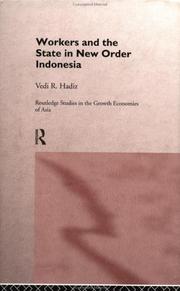
ISBN: 0415169801 Year: 1997 Publisher: London : Routledge,
Abstract | Keywords | Export | Availability | Bookmark
 Loading...
Loading...Choose an application
- Reference Manager
- EndNote
- RefWorks (Direct export to RefWorks)
Labor movement --- Labor unions --- Working class --- Mouvement ouvrier --- Syndicats --- Travailleurs --- Indonesia --- Economic conditions
Book
ISBN: 1316478505 1316478343 1316478661 1316478823 1316479463 131640238X 1107123607 110755909X 131647738X Year: 2016 Publisher: Cambridge : Cambridge University Press,
Abstract | Keywords | Export | Availability | Bookmark
 Loading...
Loading...Choose an application
- Reference Manager
- EndNote
- RefWorks (Direct export to RefWorks)
In a novel approach to the field of Islamic politics, this provocative new study compares the evolution of Islamic populism in Indonesia, the country with the largest Muslim population in the world, to the Middle East. Utilising approaches from historical sociology and political economy, Vedi R. Hadiz argues that competing strands of Islamic politics can be understood as the product of contemporary struggles over power, material resources and the result of conflict across a variety of social and historical contexts. Drawing from detailed case studies across the Middle East and Southeast Asia, the book engages with broader theoretical questions about political change in the context of socio-economic transformations and presents an innovative, comparative framework to shed new light on the diverse trajectories of Islamic politics in the modern world.
Islam and politics --- Populism --- Political science --- Indonesia --- Middle East --- Politics and government.
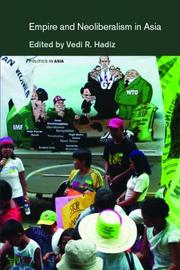
ISBN: 0415390818 Year: 2005 Publisher: London : Routledge,
Abstract | Keywords | Export | Availability | Bookmark
 Loading...
Loading...Choose an application
- Reference Manager
- EndNote
- RefWorks (Direct export to RefWorks)
Democracy --- Democratization --- Neoliberalism. --- Social conflict --- Asia --- United States --- Politics and government. --- Foreign relations
Book
ISBN: 0804773521 9780804773522 9780804768528 9780804768535 0804768528 0804768536 Year: 2010 Publisher: Stanford, Calif. : Stanford University Press,
Abstract | Keywords | Export | Availability | Bookmark
 Loading...
Loading...Choose an application
- Reference Manager
- EndNote
- RefWorks (Direct export to RefWorks)
This book is about how the design of institutional change results in unintended consequences. Many post-authoritarian societies have adopted decentralization—effectively localizing power—as part and parcel of democratization, but also in their efforts to entrench "good governance." Vedi Hadiz shifts the attention to the accompanying tensions and contradictions that define the terms under which the localization of power actually takes place. In the process, he develops a compelling analysis that ties social and institutional change to the outcomes of social conflict in local arenas of power. Using the case of Indonesia, and comparing it with Thailand and the Philippines, Hadiz seeks to understand the seeming puzzle of how local predatory systems of power remain resilient in the face of international and domestic pressures. Forcefully persuasive and characteristically passionate, Hadiz challenges readers while arguing convincingly that local power and politics still matter greatly in our globalized world.
Local government --- Decentralization in government --- Power (Social sciences) --- Elite (Social sciences) --- Indonesia --- Politics and government
Book
ISBN: 9781316402382 9781107123601 9781107559097 Year: 2016 Publisher: Cambridge Cambridge University Press
Abstract | Keywords | Export | Availability | Bookmark
 Loading...
Loading...Choose an application
- Reference Manager
- EndNote
- RefWorks (Direct export to RefWorks)
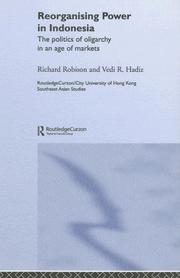
ISBN: 0415332524 020340145X 9780203401453 0203671112 9780203671115 9786610062621 6610062625 9780415332521 9780415332521 0415332532 9780415332538 9781134320240 9781134320288 9781134320295 1280062622 1134320280 Year: 2004 Publisher: London ; New York : RoutledgeCurzon,
Abstract | Keywords | Export | Availability | Bookmark
 Loading...
Loading...Choose an application
- Reference Manager
- EndNote
- RefWorks (Direct export to RefWorks)
Reorganising Power in Indonesia is a new and distinctive analysis of the dramatic fall of Soeharto, the last of the great Cold War capitalist dictators, and of the struggles that reshape power and wealth in Indonesia. The dramatic events of the past two decades are understood essentially in terms of the rise of a complex politico-business oligarchy and the ongoing reorganisation of its power through successive crises, colonising and expropriating new political and market institutions. With the collapse of authoritarian rule, the authors propose that the way was left open for this olig
Business and politics. --- Financial crises - Indonesia. --- Business and politics --- Financial crises --- Oligarchy --- Indonesia --- Economic policy. --- Politics and government.

ISBN: 0203987721 9780203987728 9781135544720 1135544727 9781135544799 1135544794 0415237505 9780415237505 9780415237505 9780415262613 Year: 2013 Publisher: London : RoutledgeCurzon,
Abstract | Keywords | Export | Availability | Bookmark
 Loading...
Loading...Choose an application
- Reference Manager
- EndNote
- RefWorks (Direct export to RefWorks)
Using an exhaustive selection of primary sources, this book presents a rich and textured picture of Indonesian politics and society from 1965 to the dramatic changes which have taken place in recent years.
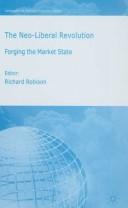

ISBN: 1403997152 9781403997159 Year: 2006 Publisher: Basingstoke [England] ; New York : Palgrave Macmillan,
Abstract | Keywords | Export | Availability | Bookmark
 Loading...
Loading...Choose an application
- Reference Manager
- EndNote
- RefWorks (Direct export to RefWorks)
The book examines the rise of the amalgam of economic and political ideas we know as neo-liberalism and how these became the defining orthodoxy of our times. It investigates the inexorable global spread of market economies and how neo-liberal agendas are accommodated or hijacked in collisions with authoritarian states and populist oligarchies. The contributors address conflicts within the neo-liberal camp itself, and ask whether neo-liberalism, with its inherent distrust of politics and fear of society, requires an illiberal state defined by techno-managerial rule, or whether it invites descent into populist social contracts.
Capitalism. --- Economic policy. --- Globalization. --- Neoliberalism.
Book

ISBN: 9780824864965 Year: 2001 Publisher: Honolulu
Abstract | Keywords | Export | Availability | Bookmark
 Loading...
Loading...Choose an application
- Reference Manager
- EndNote
- RefWorks (Direct export to RefWorks)
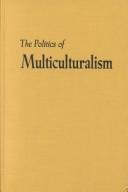

ISBN: 9780824864965 9780824824440 Year: 2001 Publisher: Honolulu, Hawaii University of Hawaii Press
Abstract | Keywords | Export | Availability | Bookmark
 Loading...
Loading...Choose an application
- Reference Manager
- EndNote
- RefWorks (Direct export to RefWorks)
| Listing 1 - 10 of 14 | << page >> |
Sort by
|

 Search
Search Feedback
Feedback About UniCat
About UniCat  Help
Help News
News